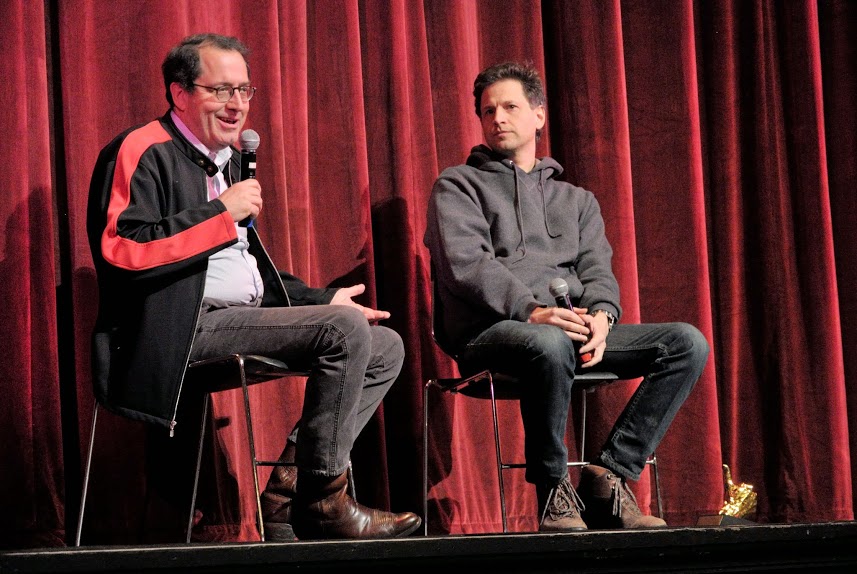Death is the ultimate end credit.
Yet it can also enrich the meaning and alter the perception of what a person has left behind.
That was the case with the 16th edition of Ebertfest this year. For many participants, the viewing of every movie on the schedule—perhaps more so than in the past—couldn’t help but be filtered through Roger’s eyes and the way he appreciated the art form. His “leave of presence,” as he called it, continues apace.
Certainly, his passing on April 4, 2013 profoundly changed the experience of seeing the festival opener—”Life Itself,” the documentary based on his 2011 memoir, whose director, Steve James, was forced to contend with an ending that he and no one else wanted.
But as the rather somber if sobering five-time Oscar nominee “Capote” screened on Friday afternoon, audience members who previously had seen the 2005 biopic that details how Truman Capote came to write his revered non-fiction crime novel “In Cold Blood” probably felt as if as if they were watching an entirely different movie. One that was forever altered by the tragic demise of its star, Philip Seymour Hoffman, who died in February at age 46 after struggling with drug addiction.
Hoffman’s Academy Award-winning depiction of the author now bears the extra burden of a shroud of loss and grief as it reminds us that America’s greatest contemporary actor is gone. But one emotion often heightens its opposite, and the crowd readily laughed with gusto at each of raconteur Capote’s catty comments or the inappropriateness of his ankle-length beige cashmere overcoat as he stealthily scoured conservative rural Kansas for details about the horrifying 1959 murder of four family members.
But any specter of mortality onscreen was also intensified. When Capote strolls through a funeral home and casually opens one of the caskets bearing a victim, he is literally staring into the face of death, albeit wrapped mummy-like in white gauze. And his eyes suddenly widen, in both shock and recognition.
Actually, it was hard not to constantly seek out Hoffman’s eyes onscreen after Michael Barker, co-president of Sony Pictures Classics, shared in his intro to the film that when he re-watched Capote recently he realized the key to Hoffman’s performance:
“No matter how sophisticated Truman Capote was, no matter how brilliant he was and how on top of the world he was, if you look deep in his eyes, the way Phil plays the part, you will notice the eyes of a man who was an abandoned child and never got over it.”
Sure enough, while the character’s posture and boastful words might suggest self-assurance, the eyes reflect a less confident demeanor in most cases –like a nervous trapped animal.
After the screening, Barker conducted a Q&A with Capote director Bennett Miller about working with Hoffman, his childhood buddy, while making his feature debut as a filmmaker.
Miller spoke candidly about the fear that would overcome Hoffman whenever he grappled with a role—especially one that required him to totally remake himself such as Capote. Save for his fair complexion, the onetime high-school wrestler with a deep gruff voice had little in common with the sophisticated cosmopolitan writer with his trademark high-pitched whine.
Asked about the actor’s preparation for the part, Miller revealed, “Phil is a terrible procrastinator and his is a long, anguished, self-brutalizing process.” Instead of using a vocal coach, “I just got him tapes and he would sit in a room with his Walkman on. He would say (speaking with a nasal whine), ‘Does this sound like him? Does this sound like him?’ It did NOT sound like him. He was very, very nervous.”
After months of attempting to capture the manner of his character, Hoffman was not much closer to being convincing. “It was like a bad Saturday Night Live sketch,” Miller says. It wasn’t until the director told his leading man to put the script down and improvise that the magic began to happen. “All of a sudden, all this campy bad stuff took on this new affirmation…It was like breaking the sound barrier.”
A bit of serendipity that often happens during film festivals occurred here. Namely, movies that are seemingly disparate are revealed to share common themes just by being on the same lineup. Both “Life Itself” and “Capote” (as well as “Young Adult,” which screened Thursday night) show the damaging effects of alcoholism on the life of a pair of prolific writers.
Capote, who ended up exploiting the two accused killers, promised to help with their appeals against a death sentence. That is, until he realized that such delays were counterproductive to meeting his book deadline and could ruin a great ending. The author’s liquor intake escalates alarmingly as the movie reaches its conclusion, when an epilogue explains that he never finished another book before his death in 1984 at age 59.
Meanwhile, “Life Itself” is not shy about showing how Roger went on regular benders with his fellow Chicago journalists and found himself on a dangerous downhill slide before cleaning up his act in 1979. As a result, he produced some of his most impressive and memorable work right up until he died.
Then there is Hoffman, a tortured soul who became sober at age 22 and remained so for 23 years—until suffering a relapse that not even rehab and the loving concern of friends and family could fix. Chaz Ebert said in her introductory remarks before “Capote” that her husband wanted the actor to play him if re-enactments of certain moments were done for the documentary. Who knows what would have happened if Philip Seymour Hoffman had a chance to step into Roger Ebert’s shoes?












